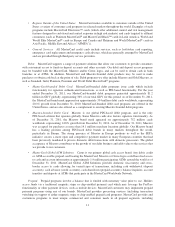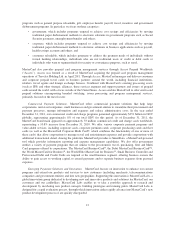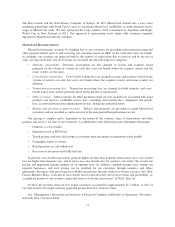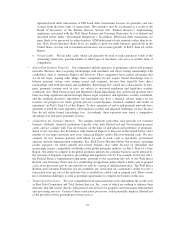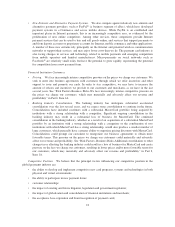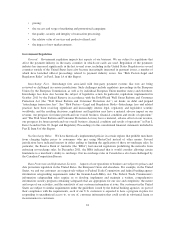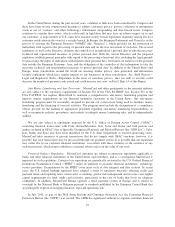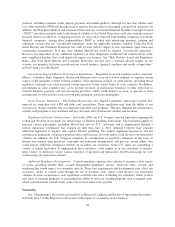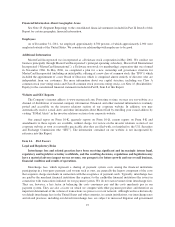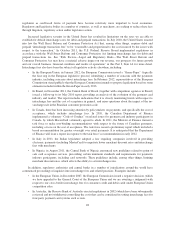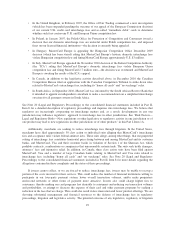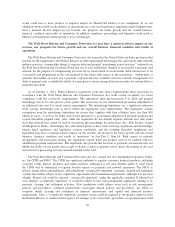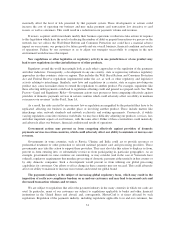MasterCard 2011 Annual Report Download - page 25
Download and view the complete annual report
Please find page 25 of the 2011 MasterCard annual report below. You can navigate through the pages in the report by either clicking on the pages listed below, or by using the keyword search tool below to find specific information within the annual report.Intellectual Property
We own a number of valuable trademarks that are essential to our business, including MasterCard®,
Maestro®and Cirrus®, through one or more affiliates. We also own numerous other trademarks covering various
brands, programs and services offered by MasterCard to support our payment programs. Trademark and service
mark registrations are generally valid indefinitely as long as they are used and/or properly maintained. Through
license agreements with our customers, we authorize the use of our trademarks in connection with our customers’
card issuing and merchant acquiring businesses. In addition, we own a number of patents and patent applications
relating to payments solutions, transaction processing, smart cards, contactless, mobile, electronic commerce,
security systems and other matters, some of which may be important to our business operations. Patents are of
varying duration depending on the jurisdiction and filing date, and will typically expire at the end of their natural
term.
Competition
General. MasterCard programs compete against all forms of payment, including paper-based transactions
(principally cash and checks); card-based payment systems, including credit, charge, debit, prepaid, private-label
and other types of general purpose and limited use cards; contactless, mobile and web-based payments; and other
electronic transactions such as wire transfers and Automated Clearing House payments. As a result of a global
trend, electronic forms of payment such as payment cards are increasingly displacing paper forms of payment,
and card brands such as MasterCard, Visa, American Express and Discover are benefiting from this
displacement. However, cash and checks still capture the largest overall percentage of worldwide payment
volume.
Payment Card, Processing and Alternative Competitors.
•General Purpose Payment Card Industry. Within the general purpose payment card industry, we face
substantial and increasingly intense competition worldwide from systems such as Visa (including Plus®
Electron and Interlink), American Express and Discover, among others. Within the global general
purpose card industry, Visa has significantly greater volume than we do. Outside of the United States,
some of our competitors such as JCB in Japan and UnionPay in China have leading positions in their
domestic markets. Regulation can also play a role in determining competitive market advantages for
competitors. For example, UnionPay is the sole domestic processor designated by the Chinese
government and operates the sole national cross-bank bankcard information switch network in China as
a result of local regulation. Some governments, such as India and Russia, are promoting local networks
for domestic processing and there are similar developments in other countries. See “Risk Factors-Legal
and Regulatory Risks- Government actions may prevent us from competing effectively against
providers of domestic payments services in certain countries, which could adversely affect our ability to
maintain or increase our revenues” in Part I, Item 1A of this Report.
•Particular Segments. We face competition with respect to particular segments of the payment card
industry, including:
ODebit. In the debit card sector, we also encounter substantial and increasingly intense competition
from ATM and point-of-sale debit networks in various countries, such as Interlink™, Plus and Visa
Electron (owned by Visa Inc.), Star®(owned by First Data Corporation), NYCE®(owned by FIS),
and Pulse™ (owned by Discover), in the United States; Interac in Canada; EFTPOS in Australia;
and Bankserv in South Africa. In addition, in many countries outside of the United States, local
debit brands serve as the main brands while our brands are used mostly to enable cross-border
transactions, which typically represent a small portion of overall transaction volume.
OPIN-Based Debit Transactions. In the United States, some of our competitors process a greater
number of PIN-based debit transactions at the point of sale than we do. In addition, our business and
revenues could be impacted adversely by the tendency among U.S. merchants to migrate from
21


